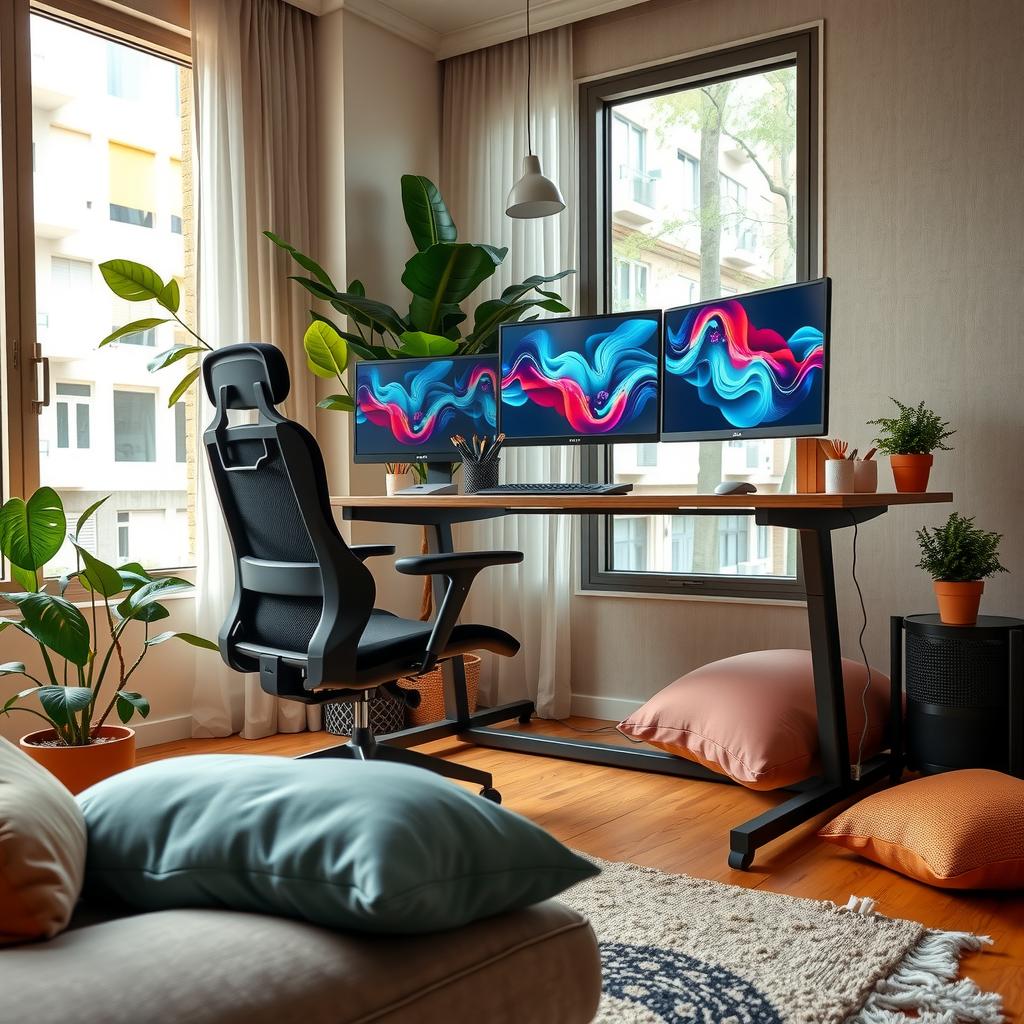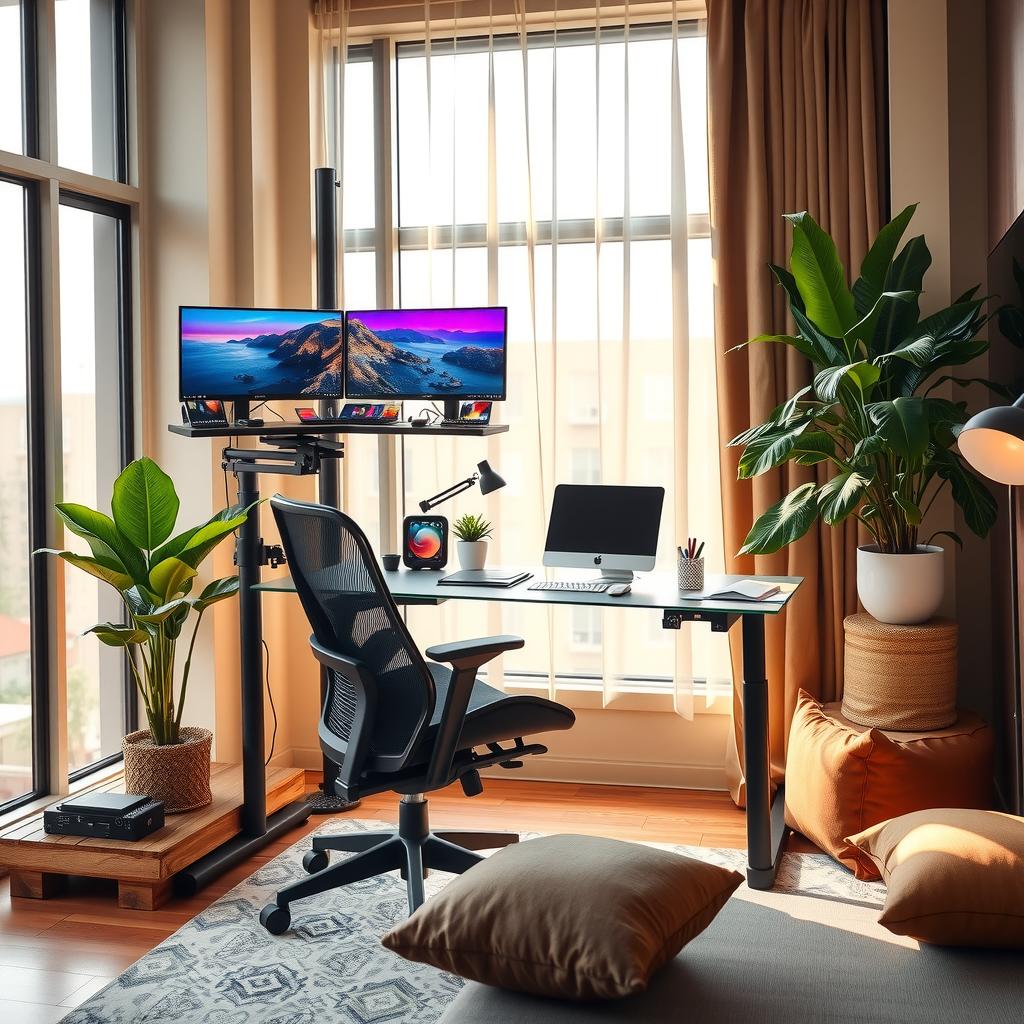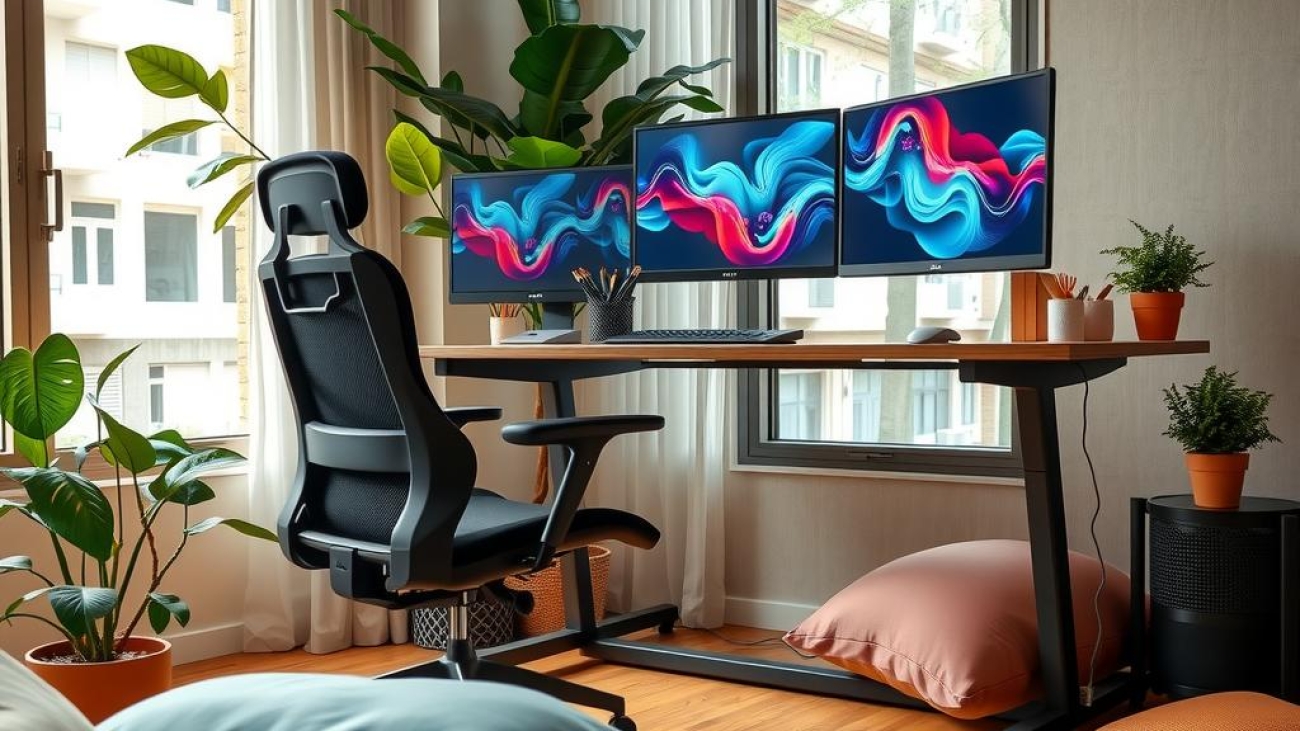In today’s fast-paced world, the rise of digital nomads—individuals who travel while working remotely—has transformed how people perceive work environments. Many find themselves setting up their offices in hotel rooms, where comfort and functionality often clash with the limitations of temporary spaces. This phenomenon raises an essential question: How can one create an effective ergonomic office setup that fosters productivity even when living out of a suitcase? The answer lies in understanding the importance of a well-designed workspace that promotes both physical comfort and mental clarity.
Crafting an optimal office design within the confines of a hotel room is not just about aesthetic appeal; it’s about enhancing performance during remote work hours. A thoughtfully arranged workspace can significantly impact efficiency, making it crucial for digital nomads to prioritize ergonomics as they navigate their travels. By leveraging portable solutions like adjustable laptop stands or compact ergonomic chairs, these modern professionals can transform any hotel workspace into a haven for creativity and focus.
Moreover, achieving balance between aesthetics and functionality is vital for maintaining motivation while working away from home. Small adjustments such as ensuring proper lighting or utilizing noise-canceling headphones can lead to notable improvements in concentration levels. Understanding these productivity tips allows digital nomads to adapt seamlessly to various settings without compromising on health or effectiveness.
As this article unfolds, readers will discover practical strategies tailored specifically for creating flexible work environments within hotels. From selecting multifunctional furniture to optimizing space usage efficiently, each tip aims at elevating comfort at work while embracing the travel lifestyle inherent in being a digital nomad. With careful planning and attention to detail, anyone can establish an inviting atmosphere conducive to focused remote work—even amidst the transient nature of life on the road.
Join us as we explore innovative ideas that empower travelers not only to survive but thrive by designing their ideal ergonomic office setups wherever they go!

Key Takeaways:
- Optimal Desk Arrangement: Create a designated workspace that prioritizes an ergonomic setup. Utilizing adjustable laptop stands and compact desks can foster a healthier posture, reducing strain during long hours of remote work. This arrangement not only enhances comfort at work but also allows digital nomads to easily transition between leisure and productivity.
- Essential Accessories for Comfort: Incorporating accessories such as portable keyboard trays and supportive cushions can significantly improve the office design within hotel rooms. These items are designed for easy transport, enabling travelers to maintain their ergonomic setup regardless of location. By making these thoughtful additions, individuals can enhance both their comfort at work and overall efficiency.
- Flexible Lighting Solutions: The importance of proper lighting in a hotel workspace cannot be overstated. Using adaptable light sources that mimic natural daylight helps minimize eye strain while working remotely. Integrating this aspect into one’s travel lifestyle contributes to an effective flexible work environment, ensuring that productivity remains high even in temporary accommodations.

Creating a Productive Oasis in Hotel Rooms
Transforming Travel Stays into Efficient Workspaces
For digital nomads, the ability to transform hotel rooms into productive workspaces is essential for maintaining productivity while on the move. When traveling, it can be challenging to create an environment conducive to remote work due to limited space and resources. However, with thoughtful office design, one can effectively adapt any hotel room into a flexible work environment that fosters creativity and concentration. The key lies in understanding how to utilize available elements—such as furniture arrangement, lighting, and technology—to enhance comfort at work.
To begin with, selecting the right ergonomic setup is crucial. A well-positioned desk or table allows for optimal posture during long working hours. If the hotel lacks a dedicated workspace, consider rearranging existing furniture or using portable options like foldable desks or lap trays that fit comfortably on beds or couches. Furthermore, ensuring adequate lighting is vital; natural light from windows should be maximized wherever possible while adding soft lamps for evening hours contributes significantly to reducing eye strain and improving focus.
In addition to physical arrangements, integrating technology plays a pivotal role in enhancing productivity tips for digital nomads. Establishing robust Wi-Fi connections becomes imperative; thus investing in portable routers could make all the difference when dealing with unreliable internet services offered by some hotels. Moreover, utilizing tools such as noise-canceling headphones aids in blocking out distractions inherent within shared living spaces—a common challenge faced by travelers.
Furthermore, personalization of one’s workspace cannot be overlooked; incorporating personal items can evoke feelings of familiarity even amidst changing landscapes which supports mental well-being during travel lifestyle adjustments. Small plants or favorite photographs help bridge the gap between home comforts and transient accommodations—creating an inviting atmosphere leads directly back towards elevated performance levels throughout various tasks encountered within remote work routines.
Optimizing Comfort: Essential Considerations
Enhancing Productivity Through Thoughtful Space Management
The importance of comfort at work cannot be understated when it comes down creating efficient workflows amid ever-changing surroundings typical of life as a digital nomad. To maximize output potential inside hotel rooms requires not only strategic organization but also conscious efforts toward cultivating an ambiance tailored specifically towards individual needs—the balance between functionally meeting operational demands while simultaneously nurturing one’s creative instincts presents itself here again through intentional office design choices made daily.
Engaging multiple senses through soundscapes might serve as another avenue worth exploring; whether it involves gentle instrumental background music streaming via apps designed explicitly for focus enhancement or ambient sounds mimicking nature’s tranquility offers appealing alternatives aimed at fostering deeper immersion during project executions—all contributing positively towards improved concentration levels over time spent working remotely from various locales worldwide.
Moreover focusing upon health aspects related directly associated with extended periods seated behind screens brings forth insight regarding suitable break intervals incorporated strategically throughout busy schedules—simple stretching exercises conducted periodically ensure muscle relaxation counteracting fatigue induced from prolonged sitting positions observed frequently amongst those engrossed within their tasks aboard temporary setups established across diverse destinations globally experienced by many who embrace this modern-day workforce paradigm shift embraced widely today among professionals seeking flexibility coupled alongside new adventures unfolding along their journeys elsewhere away from conventional office environments alike previously familiar settings engaged routinely priorly experienced pre-pandemic times passed historically now evolved considerably since then offering unique challenges paired alongside opportunities unforeseen before hand providing ample chances ahead!
Transforming Workspaces with Ergonomic Solutions
Enhance Comfort and Efficiency in Stylish Settings
In today’s fast-paced world, where digital nomads and remote workers thrive, the importance of an ergonomic setup cannot be overstated. The modern office design is evolving to cater not just to aesthetics but also to productivity and comfort at work. Innovative furniture options such as adjustable desks allow individuals to alternate between sitting and standing, promoting better posture while reducing fatigue during long hours of work. This flexibility transforms any environment—be it a coffee shop or a hotel workspace—into a conducive area for enhanced focus. Accessories like compact keyboard trays and supportive chair cushions further augment this experience by ensuring that every component contributes towards an optimal working position. These solutions are designed with portability in mind; digital nomads can easily pack their essentials without sacrificing style or functionality.
Compact Furniture: A Smart Choice for Modern Professionals
Discover Space-Saving Designs That Don’t Compromise Style
The necessity for compact furniture has become increasingly relevant as more professionals embrace the travel lifestyle. With remote work becoming commonplace, smart space management within home offices or temporary setups is essential. Items such as sleek foldable tables provide versatility that supports various tasks without occupying excessive space when not in use. For instance, innovative shelving units can serve both aesthetic purposes while offering valuable storage solutions for documents and supplies alike—keeping everything organized yet accessible. Moreover, ergonomic chairs engineered specifically for small spaces ensure users maintain proper alignment even in confined environments; they combine sophistication with practicality seamlessly integrating into one’s workspace decorum. By embracing these compact designs, professionals enhance their overall productivity through thoughtful arrangements that foster creativity while maintaining comfort throughout their day-to-day activities.
Creating an Inviting Atmosphere
The Art of Balancing Comfort and Professionalism
Establishing a welcoming environment in transient living spaces is essential, particularly for digital nomads and remote workers who thrive in flexible work environments. One crucial aspect of this balance lies in creating an ergonomic setup that promotes comfort while maintaining professionalism. A well-designed office space should incorporate elements such as adjustable desks, supportive chairs, and adequate lighting to enhance productivity without compromising aesthetic appeal. By integrating stylish decor with functional furniture choices, individuals can cultivate a workspace that not only looks good but also serves its purpose effectively.
Designing Spaces That Inspire Productivity
The design of hotel workspaces plays a significant role in fostering creativity and efficiency among travelers. To achieve the perfect blend of comfort and professionalism, it is vital to consider how each element interacts within the overall layout. For instance, incorporating natural light through large windows or strategically placed mirrors can create an inviting atmosphere that encourages focus and minimizes distractions. Additionally, utilizing color psychology by selecting calming hues can influence mood positively—helping remote workers feel more at ease while tackling their tasks. Such thoughtful design decisions illustrate the commitment to enhancing user experience amid the demands of a travel lifestyle.
Comfort Meets Functionality: A New Standard
In today’s fast-paced world where many professionals find themselves working on-the-go or transitioning between locations frequently, implementing effective productivity tips becomes paramount. This includes recognizing the importance of designing spaces equipped with all necessary tools for seamless operation—from high-speed internet access to power outlets conveniently located throughout common areas. Furthermore, fostering community connections within these environments can inspire collaboration among guests; shared lounges or co-working zones invite interaction while reinforcing both comfort at work and professional networking opportunities essential for growth in various industries.
Creating an inviting atmosphere involves much more than mere aesthetics; it necessitates careful consideration of every detail influencing users’ experiences within these versatile settings—ultimately empowering them to maximize their potential regardless of location constraints.
Frequently Asked Questions:
Q:What are the key elements of an ergonomic setup in a hotel room?
A: An effective ergonomic setup in a hotel room should include adjustable seating, a suitable desk height, and tools that promote good posture. Incorporating items such as portable laptop stands or compact keyboards can significantly enhance comfort while working remotely.
Q:How can digital nomads maintain productivity while traveling?
A: To maintain high levels of productivity, digital nomads should prioritize creating a designated hotel workspace. This involves minimizing distractions, utilizing noise-cancelling headphones, and establishing a consistent routine. Additionally, integrating smart organizational tools can streamline workflow even in transient environments.
Q:What accessories are essential for building a flexible work environment on the go?
A: Essential accessories for fostering a flexible work environment include travel-friendly office supplies like collapsible desks and supportive cushions. These items not only enhance comfort at work but also allow individuals to easily adapt their workspace to different hotel layouts without compromising on health or efficiency.
